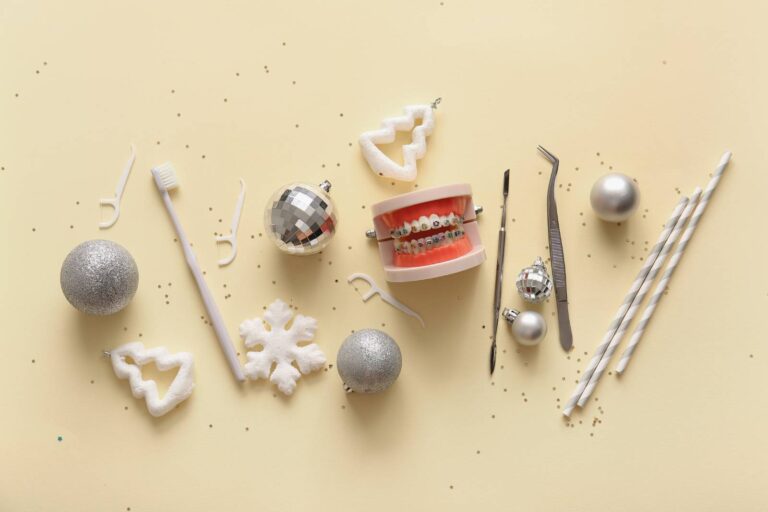October brings cooler weather, changing leaves, and the most intense part of fall sports season. Teams across West Michigan are pushing toward playoff berths and championships. The Grandville Bulldogs are fighting for positioning in their conference. West Ottawa Panthers are in the thick of playoff competition. Holland Dutch athletes are giving everything they have in these final games that determine who advances and who goes home.
Playoff sports carry higher stakes and more physical play than regular season games. Athletes are more aggressive, emotions run higher, and the intensity on the field, court, or course increases significantly. For athletes wearing braces, this elevated level of competition brings elevated risk of dental injuries.
Dr. Porto sees this pattern every fall at our Grandville and Holland locations. September brings a few sports-related orthodontic emergencies. October and early November bring more. The correlation isn’t accidental. When games matter more, athletes play harder, and protection becomes even more critical.
Why Playoff Games Are Different
Regular season games have their own importance, but playoff games carry a different weight. Athletes know that one loss can end their season. Coaches push harder in practice. Players leave everything on the field because there might not be another game.
This intensity manifests in more physical play. Soccer players challenge harder for 50-50 balls. Volleyball players dive more aggressively for saves. Basketball players fight harder for rebounds. Football players hit with more force. None of this is necessarily dangerous or wrong, but it does increase the likelihood of contact and collisions.
For athletes with braces, this means what was relatively safe during the regular season becomes riskier during playoffs. A mouthguard that seemed optional in September becomes essential in October. Protective gear that feels uncomfortable but manageable needs to be worn consistently, even when it’s annoying.
The Mouthguard Conversation Revisited
If your athlete made it through the regular season without a proper mouthguard, playoff time is when that luck runs out. The statistics are clear: as competition intensity increases, injury rates increase proportionally.
The correct model of mouthguards designed for athletes with braces provides protection that generic store-bought guards simply can’t match. They fit correctly, stay in place during high-intensity play, and actually get worn because they’re comfortable enough that athletes don’t constantly pull them out.
Some athletes resist mouthguards because they feel restrictive or make communication with teammates harder. During the regular season, you might let this slide. During playoffs, it’s not negotiable. The risk of bracket damage, lip lacerations, or knocked-out teeth is too high when every play matters and everyone is giving maximum effort.
Sport-Specific Playoff Considerations
Football playoffs mean colder weather and harder ground. Players are still hitting just as hard, but the conditions are less forgiving. A tackle that results in a face-plant on soft September grass does more damage on frozen October ground. Mouthguards are obviously essential, but so is making sure helmet straps are tight and facemasks are properly secured.
Soccer playoffs often involve more physical play as referees let teams “play through” contact that might draw fouls earlier in the season. Headers become more frequent as teams push for goals. Goalkeepers face more shots on goal, which means more opportunities for a ball to catch them in the face. If your soccer player hasn’t been wearing a mouthguard, playoff season is when it becomes necessary.
Volleyball playoffs bring harder serves, more aggressive net play, and players diving for balls they might let go during regular season. Getting hit in the face with a volleyball traveling 50+ mph can damage brackets and lacerate lips. The relatively small mouthguards designed for non-contact sports work well for volleyball and should be considered essential equipment during playoff competition.
Cross country championships might not seem like a contact sport, but falls happen, especially when runners are pushing their limits on challenging courses. Athletes often don’t think about mouthguards for cross country, but protecting teeth during a fall on a trail is worth considering, particularly during championship races where runners take more risks.
The Rivalry Factor
Late season often means rivalry games. Grandville versus Hudsonville. Holland versus Holland Christian in the Tulip City Throwdown. These games bring extra emotion and intensity beyond normal playoff pressure.
Rivalry games are wonderful for school spirit and community engagement, but they’re also the games where athletes are most likely to play beyond their limits. The desire to beat a rival can override good judgment about safety. Players take hits they should avoid, make aggressive plays they wouldn’t normally attempt, and push through pain they should report.
Parents and coaches need to be extra vigilant during rivalry games about ensuring athletes are wearing all protective equipment and making smart decisions. The glory of beating a rival isn’t worth months of additional orthodontic treatment or permanent dental damage.
When Athletes Want to Skip Protection
Some athletes resist wearing mouthguards or other protective gear during playoffs because they’re worried it will affect their performance. They think breathing will be harder, communication will suffer, or they’ll lose their competitive edge.
Here’s the reality: professional athletes in every sport wear mouthguards. Olympic athletes wear mouthguards. If elite performers can compete at the highest levels while wearing protection, high school athletes can too. The performance impact is minimal to nonexistent once athletes adapt to wearing guards consistently.
The bigger performance impact comes from dental injuries. An athlete who takes an elbow to the mouth and breaks a bracket isn’t playing in the next game while they wait for an emergency orthodontic appointment. A player who gets a tooth knocked out isn’t focused on the championship game while dealing with emergency dental surgery.
Pre-Playoff Orthodontic Check-In
If your athlete has an orthodontic adjustment scheduled right before playoffs begin, talk to Dr. Porto about timing. Sometimes we can move appointments earlier or later to avoid having freshly tightened wires during critical games.
New wires and adjustments make teeth sore for a few days afterward. This discomfort is manageable during regular activities, but it can affect an athlete’s ability to perform at their peak during a playoff game. Strategic scheduling prevents this problem.
Similarly, if your athlete has been dealing with a minor orthodontic issue—a slightly loose bracket, a wire that occasionally pokes—get it fixed before playoffs start. A minor annoyance during regular season can become a major problem when you can’t afford distractions during the biggest games of the year.
The Emergency Plan
Bracket breaks and wire issues are more likely during intense playoff competition. Have a plan before problems occur.
Keep orthodontic wax in your athlete’s equipment bag, your car, and at home. If something happens during a game, wax can provide temporary relief until you can get to our office.
Save our Grandville and Holland office contact information in your phone. Know our emergency procedures. Understand what constitutes a true emergency requiring immediate attention versus something that can wait until the next business day.
Most importantly, make sure your athlete knows to report orthodontic problems immediately rather than trying to play through them. A loose bracket that gets hit again can cause significantly more damage than one that’s reported and protected right away.
Nutrition and Hydration During Playoffs
Playoff season often means more games in shorter timeframes. Tournament weekends might involve three games in two days. Championship weeks might have midweek games plus weekend games.
This compressed schedule makes proper nutrition and hydration even more important. Athletes with braces need to be strategic about food choices that provide energy without risking bracket damage. They also need to stay hydrated, which helps reduce friction between brackets and soft tissue in the mouth.
Pack braces-safe snacks for tournament days: soft granola bars, bananas, sandwiches on soft bread, yogurt, cheese sticks. Avoid the temptation of quick energy from hard candy or sticky energy bars that can cause orthodontic emergencies mid-tournament.
Supporting Your Athlete Through Playoff Stress
Playoff pressure affects athletes mentally and emotionally. They’re stressed about performance, worried about letting teammates down, and dealing with increased expectations from coaches and parents. Adding orthodontic concerns to this stress can feel overwhelming.
Support your athlete by taking orthodontic management off their mental load as much as possible. Make sure their mouthguard is clean and accessible. Pack orthodontic wax and pain reliever in their bag. Handle scheduling for any needed adjustments. Check in about any discomfort they’re experiencing without making it a big deal.
The goal is for orthodontic care to be automatic rather than something they have to think about constantly during the most stressful athletic period of the year.
Looking Beyond This Season
Playoff season eventually ends. Some teams advance to championships, others finish their season earlier than they hoped. Regardless of outcome, the fall sports season provides valuable lessons about preparation, protection, and taking care of your body.
Athletes who successfully navigate playoff season while protecting their braces learn important lessons about managing competing priorities. They learn that you can be competitive and safe simultaneously. They learn that protection isn’t weakness—it’s smart preparation that allows you to keep competing.
These lessons extend beyond sports. The same discipline required to wear a mouthguard consistently during playoff games translates to wearing retainers consistently after orthodontic treatment ends. The attention to detail that prevents orthodontic emergencies during sports season helps maintain treatment results long-term.
Championship Mentality
Athletes talk about having a “championship mentality”—the mindset that everything matters, details count, and preparation determines outcomes. This mentality should extend to orthodontic protection during playoff season.
Champions don’t skip protective equipment because it’s slightly uncomfortable. Champions don’t risk their ability to compete in the next game by making careless choices in the current game. Champions prepare thoroughly, protect themselves intelligently, and focus on what they can control.
Your athlete can have a championship mentality about both their sport and their orthodontic care. Dr. Porto works with families in Grandville and Holland to support athletes through this critical time of year, making sure they’re protected, prepared, and ready to compete at their highest level.
Questions about protecting braces during playoff sports? Need a pre-playoff orthodontic check or emergency repair? Contact Enjoy Orthodontics in Grandville or Holland. We’re here to support your athlete through championship season.





